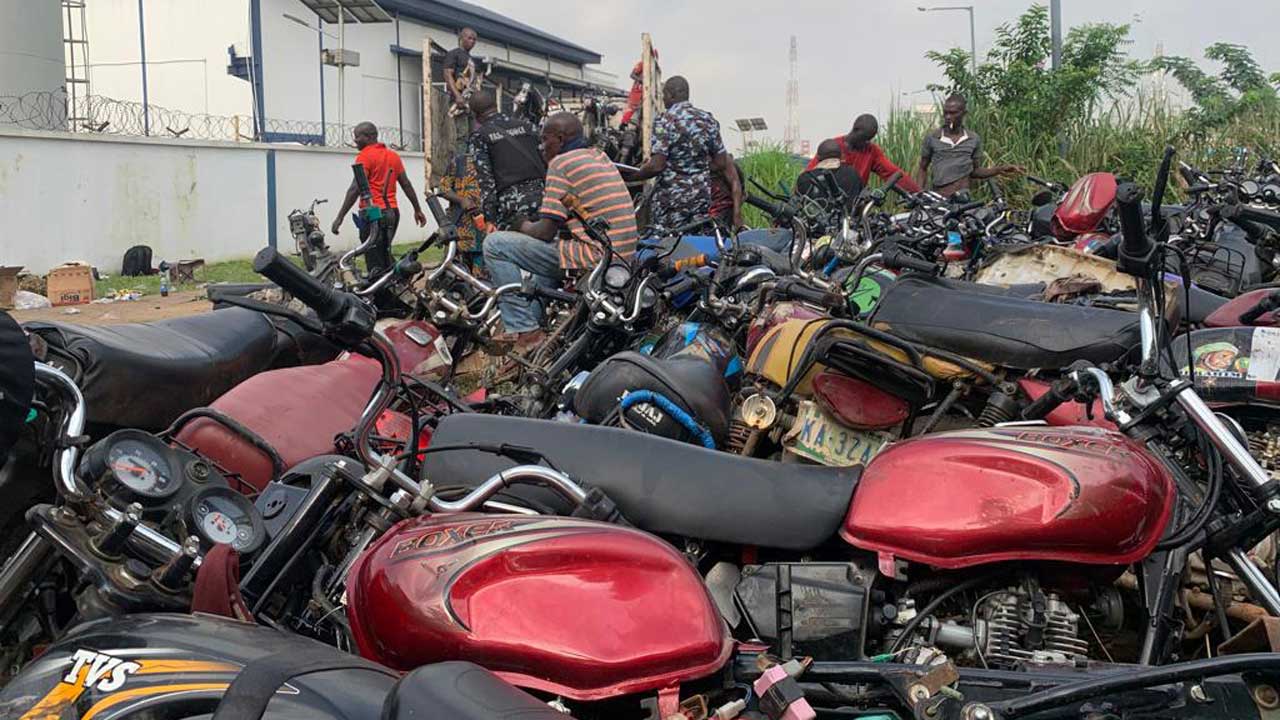
The recent ban of commercial motorcycles, popularly known as Okada, in some Local Governments and Local Council Development Areas (LCDAs) in Lagos State, has brought expected gains, as well as challenges to residents.
As one of those residents, I woke up in the morning of September 1, 2022, in the Ejigbo-Isolo suburb without the usual chaotic buzz echoing in my living room, where I normally view the main road. The reality did not hit me until my daughter was going out and waited for 10 minutes without any Okada in sight.
Coming out to see what was amiss, at first I thought rapture had taken place because there was an unusual quietude in the neighbourhood. The area was devoid of the usual hooting from the Hausa Okada riders who dogged every nook and cranny of the street. All you could see were commuters trekking, cars passing and the Keke Maruwa (tricycle) that suddenly became the sought-after brides. The orderliness was too good to be true of Lagos!
The state government in August declared a total ban on another four LGAs and six LCDAs. It began the enforcement of the extended ban last Thursday. The affected local governments are: Kosofe (Ikosi-Isheri and Agboyi-Ketu LCDAs); Mushin (Odi-Olowo LCDA); Oshodi (Oshodi-Isolo and Ejigbo LCDAs), and Shomolu (Bariga LCDA).
The Commissioner for Transportation, Dr. Frederic Oladeinde, Commissioner for Information and Strategy, Gbenga Omotosho, Commissioner for Housing, Moruf Akinderu-Fatai, and Special Adviser to the Governor on Transportation, Sola Giwa, had earlier on Wednesday, at an inter-ministerial media briefing on preparedness for commencement of the phase 2 total ban on Okada operations within four new LGAs and respective LCDAs in the state, at Alausa, Ikeja, warned that there would be no “sacred cows as no one would be spared during enforcement.’’
They warned that deterrent riders and passengers risk a three-year jail term for violation as enforcement for the Phase 2 ban starts on Friday. “We implore the general public to comply, as both the rider and passenger are both liable to three years in prison if prosecuted.’’
With the take off of the ban, some residents are of the view that the government is making life more difficult for people as there are neither sufficient shuttle buses, mini-buses (Korope) nor tricycles to fill the void. How do you expect people to get to the outer roads from the hard-to-reach inner ones? Though the okada ban eased traffic on the roads, commuters paid the price. Many commuters trekked long distances or joined commercial buses — Danfo or Korope, which adjusted their fares some notches depending on locations. Indeed, it has been quite hellish for many residents in places where the ban has been enforced.
While commuters have to adjust to the reality of the ban, there is an unusual calm and free-flow of traffic. The usual chaos on many roads, especially at major bus stops, has vanished. Even the non-state cane-carrying actors called Agberos (touts) are also off the roads – and for good!
On the flipside, however, commuters had long distances to trek because, besides the increase in fares, there were not enough vehicles to convey those willing and ready to pay the new fares.
The Lagos State Government had earlier given a notice of its intention to ban the use of Okada as a means of transportation in some parts of the state, citing security issues. This is not the first time the state government is banning the use of Okada. This explains why some residents of the state are skeptical about the government’s seriousness with the ban, wondering if the government would have the political will and strength of character this time to enforce and sustain the ban.
Ahead of the enforcement of the ban, Gbenga Omotosho, assured residents that “there was no cause to worry as necessary measures have been put in place by the law enforcement agencies to forestall any disturbance.’’
To address the criticism and uproar, Lagos State Governor, Babajide Sanwo-Olu, announced the launch of 14 commercial boats and deployed a fleet of 65 buses across new routes to expand transport options. But how adequate are these measures?
The introduction of Okada no doubt has provided a significant relief to the existing transportation system and unemployment issues. The problems associated with its operations are massive.
Agreed that there is a lot of sanity on the roads and as good as the ban is, there remains a question that has not been asked: what will become of these Okada riders? For now, the answer is in the popular expression: “it is blowing in the wind.”
Suffice to note that bans are historically difficult to implement without unintended consequences. Therefore, the state government must be on top of its game by tackling sundry issues that may arise from this latest ban.
The Okada ban in Lagos has a negative impact on both commercial and non-commercial activity. Economically, it has increased transport fares as bus drivers take advantage of increased demand and lack of alternatives. Commuters now spend a large chunk of their disposable income on bus fares. That section of the Lagos transport system should not continue unregulated or at the behest of a few.
The Local governments and the LCDAs where the latest ban has become effective must partner with the state government to make sure the ban is effective. They can introduce mini-buses to help ease commuting and create new jobs for many unemployed. The law enforcement agents too should step up their games.
On the part of the displaced Okada riders, they can find new opportunities for livelihood. Some of them who anticipated the government’s intention to ban them had acquired Keke Maruwa or Korope. There are a lot more opportunities for others willing to fall in line.
Above all, we all have a stake in creating the sane environment that Lagos deserves and should have. It begins with responsible leadership that has fidelity to the rule of law and is motivated enough to enforce the same in and out of the electoral season.






